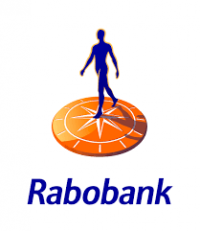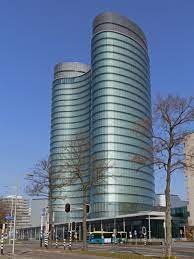Difference between revisions of "Rabobank"
| Line 149: | Line 149: | ||
=== Government === | === Government === | ||
Rabobank does not have a royal status in the Netherlands and has not | Rabobank does not have a royal status in the Netherlands and has not received NOW support from the Dutch government.<ref>https://www.uwv.nl/overuwv/pers/documenten/2021/register-vijfde-aanvraagperiode-now.aspx</ref> | ||
== Paris Agreement to Today == | == Paris Agreement to Today == | ||
Revision as of 15:38, 22 March 2022
Coöperatieve Rabobank U.A, stylized as Rabobank, is a Dutch multinational banking and financial service company leading in food and agriculture financing. It also is a big investor in mortgages and real estate in the Netherlands. It started as as a cooperation of small credit banks for farmers. After the Coöperatieve Centrale Raiffeisen-Bank and the Coöperatieve Centrale Boerenleenbank merged in 1972 it became the Coöperatieve Centrale Raiffeissen-Boerenleenbank B.A., or Rabobank. In 2016 local branches of the Rabobank and Rabobank Nederland fused under the name Coöperatieve Rabobank U.A.. It has 520 locations in the Netherlands and about 8,8 million customers in the Netherlands plus 0,7 million worldwide. The bank is active in 39 countries and has various subsidiaries.
Company Structure
Rabobank is a cooperative bank, which means they don’t have shareholders but members. Currently it consists of six governing bodies. The General Members Council consists of member representatives (the chairs of the local Supervisory Boards) and is considered as the highest governing body. It approves decisions made by the Board of Directors and Commissioners.
Board of Directors
| Name | Function | Remuneration x1000 EUR [2] |
|---|---|---|
| Wiebe Draijer (chair | CEO, Chairman of the Managing Board | 1218 |
| Bas Brouwers | CFO, Member of the Managing Board | 1099 |
| Els de Groot | Member of the Managing Board | 953 |
| Kirsten Konst | Member of the Managing Board | 995 |
| Bart Leurs | Member of the Managing Board | 954 |
| Mariëlle Lichtenberg | Member of the Managing Board | 939 |
| Berry Marttin | Member of the Managing Board | 1119 |
| Janine Vos | Member of the Managing Board | 868 |
Supervisory Board
| Name | Function | Remuneration x1000 EUR [4] |
|---|---|---|
| Marjan Trompetter | Chair | 162 |
| Jan Nooitgedagt | Vice Chair | 113 |
| Gert-Jan van den Akker | Member Supervisory Board | 64 |
| Petri Hofsté | Member Supervisory Board | 110 |
| Pascal Visée | Member Supervisory Board | 96 |
| Annet Aris | Member Supervisory Board | 90 |
| Mark Pensaert | Member Supervisory Board | 96 |
| Arian Kamp | Member Supervisory Board | 110 |
| Johan van Hall | Member Supervisory Board | 6 |
Accountant
The external accountant of Rabobank is PricewaterhouseCoopers Accountants N.V.
Main Activities
Rabobank is a financial cooperative bank and focuses on services such as payment services, savings, insurance and loans. The bank is active in various sectors such as retail banking, wholesale banking, rural banking, vendor finance, leasing and property development. The bank's biggest portfolio's are Dutch private mortgages (188.8 billion euros in 2021)[5] and private lending to the food and agriculture sector (40.3 billion euros in the Netherlands and 65.2 worldwide in 2021)<refhttps://statics.rabobank.com/binaries-processed/annual-report-2020_931168957.pdf p.8</ref>. By 2021 Rabobank had 8.9 million Dutch and 0.7 international customers.[6].
Government
Rabobank does not have a royal status in the Netherlands and has not received NOW support from the Dutch government.[7]
Paris Agreement to Today
In 2014 Rabobank provided loans to Bumitama Agri Group (BAP) who knowingly destroyed forests home to endangered orang utans. It also partially used prohibited peatlands and its plantations did not have proper permits.[8]
In 2015 it was reported that Rabobank was involved in, and profiting from, a corrupt landrobbing scheme in Romania. Corrupt officials in rural Romania were able to sell illegally confiscated land to the Rabobank (Rabo Farm) by falsifying documents in which farmers seemed to approve to sell their land. Rabobank stated it did not know about these illegal practices and referred to their own due-dilligence policy.[9]
In 2017 Rabobank, as well as ING, financed the import of granite from quarries that use child labor.[10] In a response Rabobank states that its clients comply with international labour legislation and if not they will discuss this with their clients, possibly leading them to stop their cooperation.[11]
In 2018 Rabobank NA (a Californian subsidiary of Rabobank Groep) was charged for money laundering practices and had to forfeit $368,701,259 as a result of allowing illicit funds to be processed through the bank without adequate Bank Secrecy Act (BSA) or AML review.[12]
In 2021 Global Witness reported Rabobank, since 2016, might have earned 72.6 million through deals with clients that are linked to deforestation practices. [13] The biggest corporation Rabobank invested in is Sinar Mas Group, who owns Asian Pulp and Paper (APP), a company accused of “destroying Indonesian rainforest and contributing to disastrous peatland fires.” According to Global Witness Rabobank has provided Sinar Mas with 376 million dollar in loans and credit since 2016. From these deals they could have earned about 43.8 million dollars in deforestation-adjusted earnings from these deals”. Another important client in this case is the Salim Group, a conglomerate of companies owned by Anthoni Salim, the fourth richest man in Indonesia
Rabobank, as the biggest investor in the Dutch agricultural industry, is also the largest investor in nitrogen emitting agricultural activities in the Netherlands. In 2019 the Dutch Raad van State ruled that the PAS programme (a programme rolled out by the government to distribute the amount of nitrogen that could be emitted by companies and farmers) was insufficient to use when allocating permissions to emit nitrogen. As a direct result a large number of projects (mainly in construction) that had obtained permission to emit nitrogen via the PAS programma had to be halted. A so called ‘nitrogencrisis’ broke out and ever since the government is searching for ways to drastically reduce the emission of nitrogen in various sectors. Rabobank, as a leading investor in agriculture, naturally plays an important role here.[14] [15]
Current Policies and Emissions
Rabobank reported that the emissions in their mortgages portfolio was 5,943 mln kg of Co2 in 2016, a slight improvement from their 2015 emissions which were 6,089 mln kg of Co2. The financed emissions of Rabobank in the Netherlands in 2018 were an estimated 19,099 kg of Co2. Both figures were calculated by the PCAF method. Rabobank does not give data on their worldwide emissions.[16]
Climate Plans
In their 2020 rapport on climate change Rabobank claims to commit to the goals of the Paris agreement and that it will adjust their policies to help keep global warming under 2 degrees Celsius.[17] It has so far not set any goals for the emissions in their complete value chain.
By 2023 Rabobank aims to reduce the emissions of their own operations by 20% per FTE compared to 2018, which is 40% in absolute terms. [18] It claims to have been climate neutral with regard to their own operations since 2007, partially by compensation emissions though purchasing Gold Standard certified CO2 credits. [19] Their own operations only account for a small portion of their total emissions.
According to Rabobank an important part of their climate change policies concerns their mortgage portfolio. The bank has set the goal to achieve an average energy label of B for all their mortgages by 2024 but has not set a specific Co2 emission reduction as a target.
Another important portfolio for the Rabobank is food and agribusiness. Rabobank supports the goal set by the Dutch Climate agreement of cutting emissions with 6Mton by 2030. [20] It has not set any specific emission targets for their own food and agribusiness portfolio. At the moment the bank is involved in setting up Banking for Impact on Climate in Agriculture (B4ICA).[21] This group of banks, scientists and relevant experts is set up to develop a strategy to address data gaps with regard to assessing climate impact in agribusiness. Specifically it will help estimate the carbon footprint of individual farmers and agriculture subsectors and set targets for various climate scenarios.
With regard to their SME portofolio Rabobank has not set any specific emission reduction targets.
Rabobank reports that soon all of their investment products will consist of sustainable funds band aims their funds to have 50% lower CO2 intensity compared with worldwide indices worldwide. [22] In the energy portofolio of Rabobank the biggest share of their investments is in Renewables, with around 80%, and it aims to have driven that up to about 90% in 2024. The bank has not committed itself to fully divest from carbon intensive energy.
Conclusion
The current climate policies of Rabobank are not in line with the Paris Agreement as it has not set any specific ambitions to bring the carbon emissions in their complete value chain down and eventually to zero. An important issue here is that Rabobank does not report on all the emissions in their complete value chain but only on the emissions of their own operations and their financed emissions in the Netherlands. Rabobank does have a number of plans to improve and expand on determining the emissions in their complete value chain. It also states that with regard to agriculture this is difficult because, according to them, there is not yet a scientific concensus on how to assign carbon emissions to agricultural sub-sectors. [23]
References
- ↑ https://www.rabobank.com/nl/about-rabobank/profile/organisation/board/executive-board-members.html
- ↑ https://www.rabobank.com/en/images/Rabobank_Annual-Report-2021.pdf p.105
- ↑ https://www.rabobank.com/nl/about-rabobank/profile/organisation/board/supervisory-board-members.html
- ↑ https://www.rabobank.com/en/images/Rabobank_Annual-Report-2021.pdf p. 107
- ↑ https://statics.rabobank.com/binaries-processed/annual-report-2020_931168957.pdf p. 8
- ↑ https://statics.rabobank.com/binaries-processed/annual-report-2020_931168957.pdf p. 9
- ↑ https://www.uwv.nl/overuwv/pers/documenten/2021/register-vijfde-aanvraagperiode-now.aspx
- ↑ https://www.oecdwatch.org/complaint/friends-of-the-earth-vs-rabobank/ pagina 11
- ↑ https://decorrespondent.nl/3298/hoe-gestolen-landbouwgrond-in-handen-van-rabobank-terechtkwam/726684980780-31faa12d
- ↑ https://eerlijkegeldwijzer.nl/media/373956/2017-12-qic-financiering-granietimporteurs-door-banken.pdf
- ↑ https://www.rtlnieuws.nl/geld-en-werk/artikel/3766551/ing-en-rabobank-financieren-granietbedrijven-die-betrokken-zijn-bij
- ↑ https://www.justice.gov/opa/pr/rabobank-na-pleads-guilty-agrees-pay-over-360-million https://violationtracker.goodjobsfirst.org/parent/rabobank
- ↑ https://www.globalwitness.org/en/campaigns/forests/deforestation-dividends/#rabobank-growing-better-world-together
- ↑ https://fd.nl/financiele-markten/1415722/rabo-s-moeizame-draai-naar-een-betere-wereld-lvk1caaYMvSg
- ↑ https://www.hpdetijd.nl/2019-10-04/de-rabobank-moet-meebetalen-aan-oplossing-stikstofprobleem/
- ↑ https://www.rabobank.com/nl/images/rcc-11-ver12.pdf
- ↑ https://www.rabobank.com/nl/images/rcc-11-ver12.pdf
- ↑ https://www.rabobank.com/nl/images/rcc-11-ver12.pdf p. 4
- ↑ https://www.rabobank.com/nl/images/rcc-11-ver12.pdf p.3
- ↑ https://www.rabobank.com/nl/images/rcc-11-ver12.pdf p. 12
- ↑ https://statics.rabobank.com/binaries-processed/11-annual-report-2020_931128006.pdf p. 23
- ↑ https://www.rabobank.com/nl/images/rcc-11-ver12.pdf p. 15
- ↑ https://www.rabobank.com/nl/images/rcc-11-ver12.pdf p. 20

